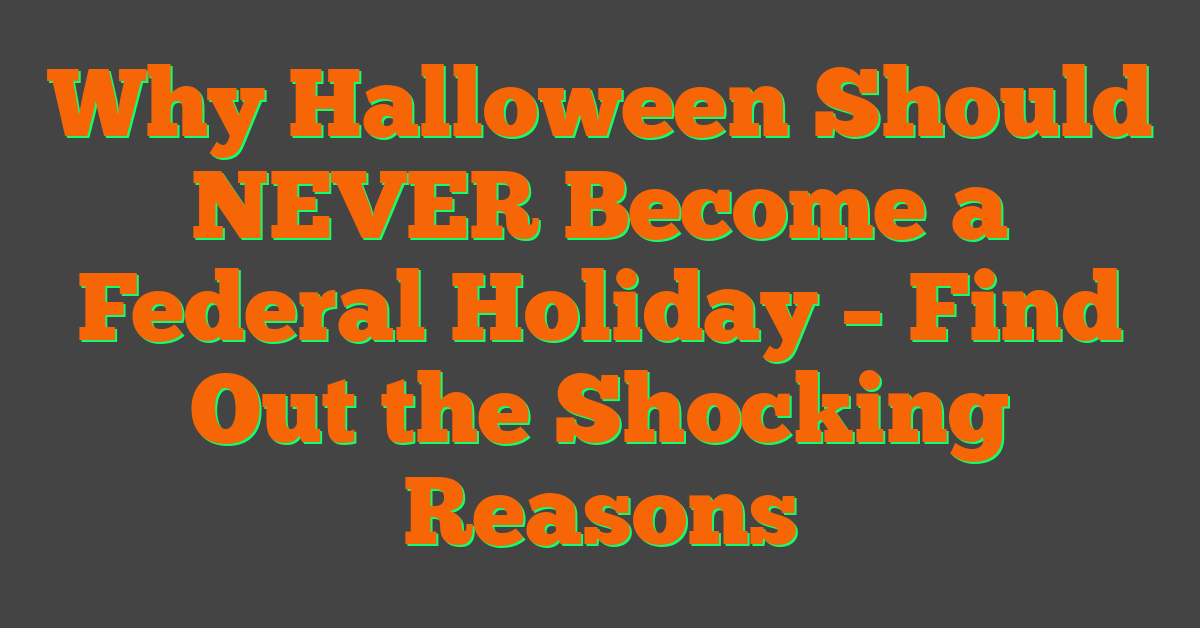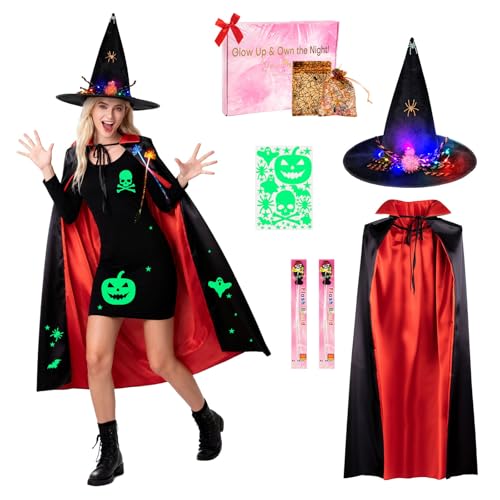Halloween is a beloved holiday that many people look forward to each year. However, have you ever wondered why it is not recognized as a federal holiday? In this article, we will explore the reasons why Halloween should not be a federal holiday. While Halloween is undoubtedly a fun and festive occasion, there are several factors to consider when it comes to its eligibility for federal holiday status.
First and foremost, Halloween is primarily celebrated as a cultural and commercial holiday, rather than a historically significant event. Unlike federal holidays such as Independence Day or Thanksgiving, Halloween does not commemorate a specific event or hold a deep historical significance. Instead, it is a holiday centered around costumes, candy, and community gatherings. While these aspects make Halloween enjoyable, they may not meet the criteria for a federal holiday.
Secondly, making Halloween a federal holiday could potentially disrupt the work and school schedules of many individuals. Federal holidays typically involve a day off from work or school, which could create logistical challenges for businesses and educational institutions. Given that Halloween falls on October 31st each year, it may not be practical to designate it as a federal holiday and disrupt the regular routines of millions of people.
Lastly, Halloween is already widely celebrated and enjoyed without the need for federal recognition. Many communities across the country organize parades, parties, and trick-or-treating events to celebrate Halloween. Families and friends come together to enjoy the festive spirit of the holiday. Therefore, there may not be a pressing need to make Halloween a federal holiday when it is already embraced and celebrated by individuals and communities nationwide.
While Halloween is a beloved holiday, there are valid reasons why it should not be recognized as a federal holiday. Its lack of historical significance, potential disruption to work and school schedules, and the fact that it is already widely celebrated make it unlikely to meet the criteria for federal holiday status. Nonetheless, Halloween will continue to be a cherished occasion for many, filled with costumes, candy, and community spirit.
History of Halloween
As a Halloween enthusiast like you, I love diving into the fascinating history of this spook-tacular holiday! So, let’s take a trip back in time and discover the roots of Halloween.
Ancient Origins: Halloween traces its origins to the ancient Celtic festival of Samhain, celebrated on October 31st. The Celts believed that on this night, the boundary between the living and the dead was blurred, allowing spirits to roam the earth. To ward off these spirits, people lit bonfires and dressed in costumes.
Christian Influence: With the spread of Christianity, the festival of Samhain gradually merged with Christian traditions. All Hallows’ Eve, the night before All Saints’ Day, became a time to remember the departed souls. Costumes were worn to imitate saints and protect oneself from evil spirits.
Arrival of Trick-or-Treating: Fast forward to the late 19th century, when Irish and Scottish immigrants brought Halloween to North America. The holiday evolved, incorporating new customs such as trick-or-treating. Children would dress up in costumes and go door-to-door, receiving treats in exchange for not playing pranks.
Commercialization Boom: As Halloween gained popularity, it became evident that it had transformed into a cultural phenomenon. The 20th century saw the rise of Halloween shops, like the one I used to work at, where you could find everything from costumes to spooky decorations. Today, Halloween has become a billion-dollar industry that brings joy to millions of people worldwide.
Halloween’s rich history and evolution make it an integral part of our cultural heritage. While it may not be a federal holiday, its significance is undeniable. So, whether you’re roaming haunted houses or searching for the perfect costume, remember to embrace the spirit of Halloween and create unforgettable memories.
Reason 1: Religious Significance
As a Halloween enthusiast named Ricky, you know that Halloween holds a special place in your heart. You go all out every year, dressing up in elaborate costumes, decking out your home in spooky decorations, and even hosting epic Halloween parties. However, despite your love for Halloween, you understand why it should not be a federal holiday.
Firstly, Halloween does not have significant religious connotations like other holidays such as Christmas or Easter. While Halloween has roots in ancient Celtic traditions and is influenced by the Christian holiday of All Saints’ Day, it is primarily seen as a secular holiday. The focus is on fun and enjoyment rather than religious observance. Making it a federal holiday could potentially blur the lines between church and state.
Moreover, not everyone celebrates Halloween for religious or spiritual reasons. For many people, it’s simply a chance to embrace their creativity and have a good time. Being a federal holiday might exclude those who do not connect with the religious aspects, inadvertently making them feel left out or excluded from the festivities.
By keeping Halloween as a cultural and community-centered holiday, it allows individuals to celebrate in their own unique ways, without any pressure or obligation. Communities can organize their own Halloween events and families can come together to create their own traditions. Making it a federal holiday might limit the freedom and creativity that comes with celebrating Halloween.
While Halloween is a beloved holiday for many, it should not become a federal holiday due to its lack of significant religious associations and the importance of preserving the flexibility and uniqueness of Halloween celebrations. So, embrace the spooky spirit, dress up as your favorite characters, and enjoy the candy-filled festivities, knowing that Halloween will continue to be cherished and celebrated by many, even without federal recognition.
Reason 2: Cultural Diversity
As a Halloween enthusiast like Ricky, you understand that one of the beautiful aspects of Halloween is its ability to bring people from different cultures together in a fun and inclusive way. Halloween is celebrated by people of all backgrounds, beliefs, and traditions, making it a truly diverse and inclusive holiday.
When Halloween is recognized as a federal holiday, there is a risk of diluting its cultural significance. By keeping it as a cultural and community-centered holiday, individuals are able to celebrate in their own unique ways, without any pressure or obligation to conform to a specific set of customs or traditions.
The beauty of Halloween lies in its ability for people to express their creativity, imagination, and individuality. Whether you want to dress up as a classic vampire, a spooky ghost, or a popular movie character, Halloween allows you to unleash your inner creativity and be whoever you want to be for a night. It’s a time when you can discover new talents in makeup and costume design, and show off your unique personality.
Furthermore, Halloween provides an opportunity for local businesses and communities to thrive. From small family-owned pumpkin patches to haunted houses and local Halloween stores like the ones Ricky has worked at, these businesses rely on the excitement and support Halloween generates each year. Making Halloween a federal holiday might overshadow the local businesses and diminish their significance.
By keeping Halloween as a cultural celebration, we can continue to embrace and appreciate the wide range of traditions and customs that different communities bring to the holiday. It allows us to appreciate the beauty of cultural diversity and ensures that everyone, regardless of their background, can participate and enjoy the festivities.
So, let’s keep Halloween as a beloved holiday, free from federal recognition, and celebrate its power to bring people together in a spirit of fun, creativity, and cultural diversity.
Reason 3: Economic Burden
As an avid Halloween enthusiast, you know just how much excitement and joy this holiday brings. From the spooky decorations to the creative costumes, Halloween allows us to embrace our imagination and express our individuality. But amidst all the fun and festivities, there’s one aspect of Halloween that often gets overlooked: its economic impact.
Halloween generates a significant amount of revenue each year, benefiting both local businesses and communities. According to the National Retail Federation, Americans are predicted to spend over $10 billion on Halloween-related purchases annually. This includes everything from costumes and decorations to candy and party supplies. By keeping Halloween as a cultural celebration, rather than a federal holiday, we ensure that local businesses, like the ones I’ve had the pleasure of working at, continue to thrive.
Making Halloween a federal holiday might put unnecessary financial strain on individuals and families. As we all know, holidays often come with a long list of expenses. Adding Halloween to that list might make it harder for some families to fully participate in the celebrations. By keeping it as a cultural celebration, we allow people to choose their level of involvement based on their personal budget and preferences.
Moreover, Halloween as a federal holiday could potentially overshadow other important events. October is a month filled with numerous holidays and observances, like Columbus Day, Indigenous Peoples’ Day, and Breast Cancer Awareness Month, to name a few. Recognizing Halloween as a federal holiday might detract attention away from these significant events, diluting their impact and relevance.
Let’s not forget the impact Halloween has on the job market as well. Many seasonal jobs are created every year to support the increased demand during the Halloween season. Retailers, haunted attractions, and other businesses hire temporary employees to meet the needs of Halloween enthusiasts like us. By keeping Halloween as a cultural celebration, we help preserve these job opportunities and support local economies.
By highlighting the economic burden that recognizing Halloween as a federal holiday might have, we can understand the importance of keeping it as a cultural celebration. Halloween provides an opportunity for businesses to thrive, individuals to enjoy their creativity, and communities to come together in celebration. So, let’s continue to embrace the spirited traditions and experiences of Halloween without the need for federal recognition.
Reason 4: Infringement on Personal Freedoms
As a Halloween enthusiast, you believe that Halloween should remain a cultural celebration rather than a federal holiday because making it a federal holiday could potentially infringe on your personal freedoms and creativity.
By keeping Halloween as a cultural celebration, you have the freedom to choose how you want to celebrate it. Whether you prefer elaborate costumes, spooky decorations, or throwing a Halloween party, you have the flexibility to express your creativity and individuality without any external pressures or constraints. It allows you to truly embrace the spirit of Halloween and have fun in your own unique way.
However, if Halloween were to become a federal holiday, there might be expectations and regulations imposed on how it should be celebrated. This could dilute its cultural significance and put unnecessary pressure on individuals to conform to specific customs and traditions. The beauty of Halloween lies in its diversity and the ability to celebrate it in a way that resonates with each individual.
Furthermore, keeping Halloween as a cultural celebration ensures that you can continue to support local businesses and communities. Many Halloween enthusiasts, like yourself, rely on the excitement and support generated by Halloween each year. Whether it’s purchasing costumes, decorations, or attending haunted attractions, Halloween provides a boost to local economies and job opportunities. If Halloween were to become a federal holiday, it may divert attention and resources away from these small businesses and negatively impact their livelihoods.
By preserving Halloween as a cultural celebration, you can maintain the freedom to express your creativity and individuality without any imposed expectations. It allows you to support local businesses and communities while embracing the unique spirit of Halloween. So let’s keep Halloween as a beloved holiday without federal recognition and continue to celebrate it in our own special way each year.
Reason 5: Government Overreach
You love Halloween. Every year, you go all out with your decorations, costumes, and festivities. It’s a time for you to express your creativity and embrace the spooky spirit. As a Halloween enthusiast who has worked at Halloween shops, you understand the importance of preserving the cultural celebration of Halloween without it becoming a federal holiday.
Government overreach is a concern when it comes to making Halloween a federal holiday. The government’s involvement might lead to unnecessary regulations and expectations for how Halloween should be celebrated. This could infringe on your personal freedoms and creativity, taking away the individuality that makes Halloween so special.
By keeping Halloween as a cultural celebration, you have the freedom to celebrate it in your own unique way. You can create your own traditions and customs that reflect your personal interests and background. Whether you prefer a traditional Halloween with witches and pumpkins or a more modern twist with superheroes and movie characters, the choice is yours.
Furthermore, government recognition of Halloween as a federal holiday could result in financial strain for individuals and families. Halloween already comes with its fair share of expenses, from costumes to candy and decorations. Making it a federal holiday might put additional financial pressure on everyone. It could overshadow other important events in October that are already widely celebrated, such as Breast Cancer Awareness Month or Hispanic Heritage Month.
Let’s keep Halloween as a cultural celebration, supporting local businesses and communities. It’s the time of year when Halloween shops pop up, creating job opportunities and stimulating local economies. By keeping it outside of the federal holiday realm, we can continue to embrace and celebrate Halloween freely, without unnecessary government interference.
Conclusion
Halloween should remain a cultural celebration rather than a federal holiday. By keeping Halloween as a cultural celebration, we can preserve its unique charm and allow for the expression of creativity and individuality. Making it a federal holiday might exclude those who do not connect with the religious aspects of Halloween and dilute its cultural significance. Moreover, recognizing Halloween as a federal holiday could put unnecessary financial strain on individuals and families, overshadowing other important events in October. By keeping Halloween as a cultural celebration, we can support local businesses and communities that rely on the excitement and support Halloween generates each year. Additionally, government overreach is a concern when it comes to making Halloween a federal holiday, as it may impose expectations and regulations on how it should be celebrated, infringing on personal freedoms and creativity. Therefore, it is best to preserve Halloween as a beloved holiday without federal recognition.













